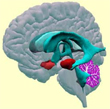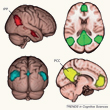Monday, 23 February 2015
How Posture Can Affect the Brain

For decades now, scientists have had a good knowledge of the descending neural and hormonal pathways by which the human brain influences the human body. But until quite recently, there was still a tendency to underestimate just how much the human body influences the human brain. In an experiment reported in 2010, however, social psychologist Amy Cuddy showed that simply adopting a body posture associated with dominance will, within two minutes, cause measurable changes in people’s blood concentrations of certain hormones, and in certain of their behaviours, such as risk-taking. (more…)
From Thought to Language | Comments Closed
Tuesday, 10 February 2015
Famous Amnesia Patient “K.C.” Dies

He was almost as famous as Henri Molaison, the famous patient “H.M.” who was studied for decades by eminent researchers such as neuropsychologist Brenda Milner, in Montreal, and who died in 2008. Patient “K.C.”, whose real name was Kent Cochrane, died more recently, on March 27, 2014, at the age of 62.
K.C. grew up in the suburbs of Toronto. Unlike H.M., who had had his two hippocampi surgically removed because of epilepsy, K.C. suffered serious damage to his brain, including both hippocampi, in a motorcycle accident on his way home from work, at the age of 30. (more…)
Memory and the Brain | Comments Closed
Tuesday, 27 January 2015
Functions of the amygdala : more diverse than previously thought

Science in general, and neuroscience in particular, are constantly evolving. So even though our knowledge of a given brain structure may not have undergone a scientific revolution or a paradigm shift at any given time, when we compare what we know about it now with what we knew, say, 10 years ago, we may find that things have changed a lot. That’s certainly the case for the amygdala, a small but very important piece of the brain. And since we first described the amygdala on this website just about 10 years ago, we’d like to give you a little update now. (more…)
Emotions and the Brain | Comments Closed
Tuesday, 6 January 2015
Literary Activity and the Default Mode Network

In every human culture, much of life revolves around the stories that we tell—about the world around us, about other people, and about ourselves. When you come right down to it, just like traditional oral storytelling, that is all that modern literature and film do today. There must be something in the brain that resonates especially strongly with the narrative process.
That something might well resemble what neuroscientists call the the brain’s default mode network: the particular set of brain structures whose activity increases by default, when someone is doing absolutely nothing. (more…)
From Thought to Language | Comments Closed
Tuesday, 16 December 2014
The Infinitely Large, Infinitely Small, and Infinitely Complex

This week, we’re going to talk about nothing less than the place that the human brain occupies in the known universe. Let’s begin by recalling that, as stated often elsewhere on The Brain from Top to Bottom, the brain that each of us possesses is one of the most complex objects in that universe, which is already saying a lot.
The complexity of the human brain is one of the reasons that this website is organized the way it is. (more…)
From the Simple to the Complex | Comments Closed








